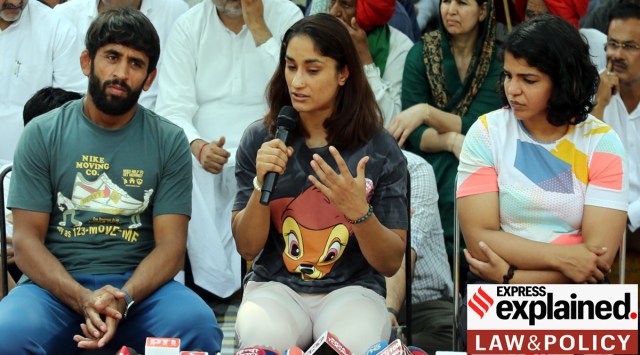
What does the law say about registration of an FIR once a sexual harassment complaint is received by the police?
Section 154 (1) of the Code of Criminal Procedure enables the police to register an FIR after information is received about a cognizable offence. A cognizable offence/case is one in which a police officer may make an arrest without a warrant. Sections pertaining to sexual harassment and sexual assault of the Indian Penal Code fall within the category of cognizable offences.
The registration of an FIR is the first step towards the probe. It sets into motion the investigation and the police may seek custodial interrogation of the accused, file a chargesheet based on the evidence, or file a closure report if the probe reveals no merit in the allegations made in the FIR.
The law also has provision for the registration of a ‘Zero FIR’, where even if the alleged offence has not been committed within the jurisdiction of the police station approached, the police can file an FIR and transfer it to the police station concerned.
Is failure to register an FIR an offence?
The Report of the Committee on Amendments to Criminal Law, popularly known as the Justice J S Verma Committee, formed in the aftermath of the December 16, 2012 Delhi gangrape case, recommended insertion of a section where if an officer-in-charge of a police station refuses ‘or without reasonable cause’ fails to record information related to a cognizable offence, he shall be punished.
Story continues below this ad
Based on the committee’s recommendation, section 166A was inserted in the Criminal Law (Amendment) Act, 2013. The section states that if a public servant knowingly disobeys any direction of law including failing to record any information given to him in relation to a cognizable offence, rigorous imprisonment for a term of minimum six months and maximum two years can be given, and he shall also be liable to paying a fine.
Although this includes all cognizable offences, the provision particularly mentions certain sections of the IPC, including those related to sexual harassment, rape, and gangrape. These sections were specifically added to enhance safeguards to women, noting the increase in crimes against women.
On Tuesday, senior advocate Kapil Sibal, representing the wrestlers, mentioned this section while arguing before the Supreme Court. It was submitted that the complaints were given to the Delhi police on April 21 and no FIR was filed, following which they approached the court.
The Ministry of Home Affairs (MHA) has been issuing advisories on mandatory action by police in cases of crimes against women. On October 9, 2020, the MHA reissued an advisory stating the need to compulsorily register an FIR in cases of cognizable offences under section 154 (1) of the CrPc.
Story continues below this ad
Since the complainants against Singh include a minor, what are the FIR provisions under Protection of Children from Sexual Offences (POCSO) Act?
The POCSO Act mandates reporting of sexual offences against children. Section 19 states that any person who has an apprehension that an offence under POCSO Act has been committed shall provide such information to the Special Juvenile Police Unit or the local police. The section also requires the registration of an FIR, ascribing information received with an entry number and a record in writing.
Section 21 of the Act even states that any failure to report the commission of an offence or failure to record such an offence shall be punished with imprisonment extending to six months or a fine or both. The Act, therefore, also makes it mandatory for a report to be filed on receiving a complaint, including from a child.
What are the other remedies if police refuse to file an FIR?
Section 154 (3) says that a person who has been aggrieved after a police in-charge refused to file an FIR can send the information to the Superintendent of Police. The SP, after verification that the information discloses the commission of an offence, shall either investigate the case herself or direct for a probe by any police officer subordinate to her.
Story continues below this ad
The Supreme Court on Tuesday also said that a remedy under section 156 of the CrPC was available. If a person is aggrieved by the police’s refusal to file an FIR, a complaint can be made before a magistrate under section 156 (3). The magistrate court can then order registration of a case at the police station. The complaint before the magistrate would be treated as an FIR and the police can initiate its investigation.
Can a preliminary inquiry be conducted before registration of an FIR?
Solicitor General Mehta told the Supreme Court on Wednesday that it wanted to conduct a preliminary inquiry first before filing an FIR. The court directed all material to be put before it during the next hearing on Friday.
Senior Advocate Sibal also raised the law under Lalita Kumari vs Govt of UP and ors. The main issue before the Supreme Court in this case decided in 2013 was whether the police officer is bound to file an FIR for information received of a cognizable offence or does the officer have the power to conduct a ‘preliminary inquiry’ to test the veracity of the information before registering an FIR.
Story continues below this ad
The Constitution bench concluded that registration of an FIR under section 154 CrPC is mandatory if information of a cognizable offence is received. “… Other considerations are not relevant at the stage of registration of FIR, such as, whether the information is falsely given, whether the information is genuine, whether the information is credible etc,” the court said.
It also said, “The scope of preliminary inquiry is not to verify the veracity or otherwise of the information received but only to ascertain whether the information reveals any cognizable offence.”
It gave an illustrative list of categories of cases where such an inquiry can be made, including family disputes, commercial offences, medical negligence and corruption cases or cases where there is an abnormal delay in reporting the matter. The court said that an inquiry should not exceed seven days.








































